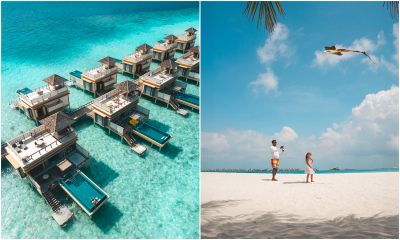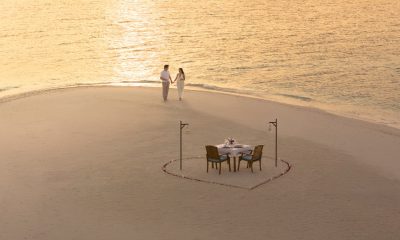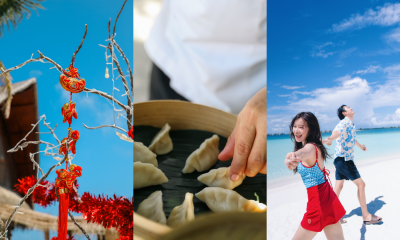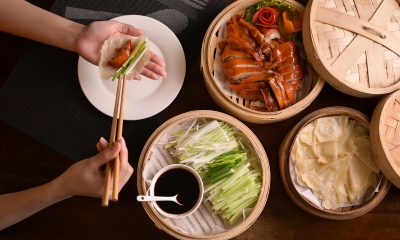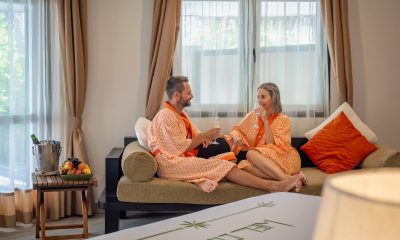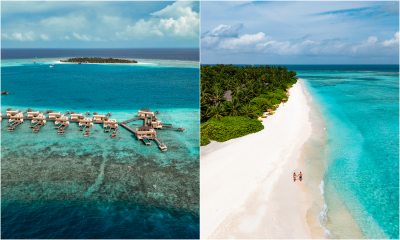Featured
Axel Jarosch: maintaining Banyan Tree Vabbinfaru, Angsana Ihuru’s appeal amidst growing competition

Axel Jarosch is by all means a hospitality veteran. Turning a childhood dream into a successful career that is marked by high-level postings all over the world with some of the most reputed hotel chains in the world, he still sees hospitality as one of the most gratifying fields.
It is this enthusiasm, coupled with years of experience, that he brings to his current role as General Manager for North Male, responsible for overall operations for Banyan Tree Vabbinfaru and Angsana Ihuru.
Before taking up his current posting in the Maldives in January, the German-born hospitality executive, who holds a Bachelors degree in International Hotel Economics and Hospitality from Fritz Gabler Hotelfachschule Heidelberg in Germany, served as the General Manager of Banyan Tree Al Wadi and Banyan Tree Ras Al Kaimah in the United Arab Emirates for almost two and a half year.
Prior to joining Banyan Tree Hotels and Resorts in 2014, Axel was the General Manager at Six Senses Zighy Bay. He has previously served as the Operations Director responsible for the hotel openings of Anantara Hotels, Resorts and Spas in Abu Dhabi, and has also held the position of General Manager with Anantara in Oman, Bali and Indonesia during pre-opening stages. He has also held managerial roles at Per AQUUM, Constance Hotels, InterContinental Hotel Group, and Starwood Hotels and Resorts Group. In addition to his time in the Gulf, he has worked in Sri Lanka, the Seychelles, Namibia and Mauritius.
In an interview with Maldives Insider, Axel looks onto the challenges as well as the opportunities of running Banyan Tree Vabbinfaru, one of the oldest resorts in the Maldives, and its sister property Angsana Ihuru in North Male Atoll, in the face of ever-increasing competition and changing travel trends.
Maldives Insider: How did you develop an interest in tourism and hospitality?
Axel Jarosch: I started my career at the age of 22. I studied economics, and while going to university in Germany I worked part-time in a number of hotels and restaurants. I started at the very bottom, doing an internship at a business hotel in Germany. I progressed in my career, going into food and beverage. I developed myself from a waiter to a restaurant captain to a supervisor to a manager to Assistant Food and Beverage Manager to Executive Assistant Food and Beverage Manager to Resident Manager and finally becoming a General Manager. My first General Manager posting was with Per AQUUM, opening The Fortress hotel in the Sri Lankan town of Galle.
On my first day itself, I fell in love with the industry. Working in this industry is very gratifying because you make it your day’s work to make other people happy. That for me is very unique.
I have always wanted to work internationally, moving and seeing other countries and cultures. This was a profession that gave me that opportunity. I have been blessed to have been able to work in South East Asia, Middle East, Africa and in the Indian Ocean. I cannot imagine doing any other job!
MI: When was your first visit to the Maldives?
AJ: I visited the Maldives for holiday about 10 years ago, and immediately fell in love with the country. What is there not to like? It really is a paradise.
What I find extremely unique about the Maldives is to have a team of predominantly local associates; in the case of Banyan Tree Vabbinfaru and Angsana Ihuru, people who have been working in this island for 15-30 years! To keep doing what they do with so much passion after so long is amazing. I am used to working in very remote locations, and I love working on these islands. In our profession, we do not have the same day twice. We are always welcoming different guests and dealing with new challenges. So, it is never boring.

Aerial view of Banyan Tree Vabbinfaru. PHOTO/ BANYAN TREE
MI: What do you focus mostly on in overseeing the operations of Banyan Tree Vabbinfaru and Angsana Ihuru?
AJ: My main focus is to continue the successful operation of Banyan Tree Vabbinfaru and Angsana Ihuru in the North Male Atoll, while maintaining the high standards that Banyan Tree is known for. I am also focused on continuously improving the services that we give to our guests. It can only be achieved by overseeing the training programmes and career development opportunities available to the associates, and by succession planning.
It is also my responsibility to increase awareness in the international arena about these two resorts. Banyan Tree was one of the first international brands that came to the Maldives. We were the first to introduce the spa concept to the Maldives. But we cannot live in the past. We can only move forward, evolve and grow the brand as well. We have got three beautiful resorts in the Maldives, but it does not mean that everybody knows about us.
MI: What are the efforts being made to achieve those goals?
AJ: One of my favourite words is consistency; being consistent in providing our guests with brand standards of personalised service. I think this is where we stand out, and Banyan Tree as a hotel group is unique. It is not so much about a guest staying in a villa, but more so about knowing the preferences of the guests and making sure that we personalise everything we do. For example, if you come in the morning for breakfast on your first day here and order a cappuccino, the team takes note of that and offers you a cappuccino the next day at breakfast rather than offering you the full expanse of our coffee menu. Another thing we do is to have the same associate look after you on your every visit and create a bond between the guest and the team here. This is something we are good at, and we see that pay off by the high percentage of repeat guests we have. That is because the guest feels at home here rather than being in a hotel.

A beach front pool villa at Banyan Tree Vabbinfaru. PHOTO/ BANYAN TREE
MI: What are the programmes conducted to maintain the service standard?
AJ: We look after our team well. As an employer, Banyan Tree is well-known for fair employment; of looking after the interests of the associates and recognising the good work they do. That is reflected in the very low staff turnover that we have. Having that high number of team members that have been loyal to the company speaks for the brand itself.
We make sure that each and everyone of our team is treated fairly and that they can continuously develop themselves. For example, under our cross exposure programme, we send a member of the team to one of our other resorts either in Thailand, Seychelles or elsewhere. We have jop swap; for example, I have right now team members from one of our Thailand properties looking after the main restaurant here. Their counterparts here have gone to Thailand to look after the main dining restaurant in Banyan Tree Phuket.
MI: What are the challenges in running an established property like Banyan Tree Vabbinfaru?
AJ: Logistics is always a challenge when it comes to working in the Maldives, where tourism resolves around the ‘one island, one resort’ concept. You have to know what to buy, when to buy and how much to buy. Everything else is easy because our resorts and our teams are very well-established.
But knowing that you have a 20-year-old product and still maintaining a certain standard that makes guests pay a certain amount of money to stay in is a challenge. In the recent past, we have made minor renovations such as changing the concept of our main restaurant to show some innovation. We have also added pools to the villas.
Since then, it has been about maintaining those standards through what we call a villa maintenance programme. Under this programme, every guest villa is completely redone every single year.

A deluxe beach front villa at Banyan Tree Vabbinfaru. PHOTO/ BANYAN TREE
MI: A number of new resorts are opening up across the Maldives, and especially in the Male region. Would this affect the performance of established properties like Banyan Tree Vabbinfaru?
AJ: I welcome competition. I think it is important, especially in hospitality. The moment you have competition, you start to develop your own property because you obviously do not want guests to go to another property.
Our resorts in North Male Atoll are very small; Banyan Tree Vabbinfaru has 48 villas and Angsana Ihuru has 45 villas. We have not seen a downturn in occupancy. We have been very lucky, especially in the first half of this year, as we were able to reach our forecast in terms of occupancy. I do not think a lot of our guests will go to other resorts because guests that come to a Banyan Tree have certain expectations. For example, we do not have any water villas here in the north. We are one of the few resorts still maintaining that original concept. Guests that come here want direct access to the beach and we have kept it that way. There are resorts opening up with over 100 water villas here in this atoll as well, but those are for a different clientele.
We are very lucky, as we have been very successful over the last 20 years. The awareness about Banyan Tree Vabbinfaru amongst our base clients, which is still predominantly Europeans, will continue to give us the exposure. But we need to concentrate on emerging markets that are now discovering the Maldives. Countries with three to four-hour flight distance like India, whose people have more disposable income than before, are now coming to the Maldives as well. So, we need to tap into those markets, and make sure that we are not relying on just one market.

Destination dining at Banyan Tree Vabbinfaru. PHOTO/ BANYAN TREE
MI: What should be done to tap into those markets?
AJ: We need to find the demands and expectations of guests coming from those markets. For example, Indian guests will have different expectations from Brits. We need to find ways to cater to those demands on a personalised level, be it adapting the restaurant menu, an entertainment concept or different recreational activities.
MI: How would you describe your experience in the Maldives?
AJ: It has been extremely satisfying. I consider myself very fortunate and lucky to be here. I love the brand. I started working for Banyan Tree because of the core values of sustainability that the brand has. We have been adopting several sustainable practices, be it coral planting, turtle programmes and preserving the underwater beauty of the Maldives, which is two thirds of the overall beauty of the country. The fact that Banyan Tree as a group puts such an emphasis on this makes me so proud to be part of this team.
We have guiding values of sustainability, including building green communities. All these values are followed by every Banyan Tree property in the world. We do some things a little bit differently here in the Maldives. For example, every Banyan Tree resort is tasked to plan 2,000 trees per year. Obviously being in the Maldives, there is so much that you can plant. So, instead of trees, we plant corals. Our marine lab, which is one of the first marine labs in the Maldives and has been operating for the past 15 years, puts a lot of emphasis on creating coral gardens, especially following the recent El Nino effect.
We also work together with local ministries and organisations to do studies on fish populations. Our work also extends to educational programmes with local schools.
Cooking
Patina Maldives hosts Chef Shannon Bennett for exclusive April residency

From 1 to 5 April 2026, Patina Maldives, Fari Islands will host Shannon Bennett, one of Australia’s most recognised culinary figures and the creative force behind Belongil. The residency brings together a chef known for shaping dining as an emotional and reflective experience with a destination defined by perspective, creativity and purpose.
Bennett’s career extends beyond traditional notions of cooking. Through projects such as Vue de Monde and Belongil, he has explored dining as a medium for memory, connection and emotion, placing emphasis on experience rather than consumption. His approach centres on creating moments that remain with guests long after the meal has ended.
At Patina Maldives, the residency represents a convergence of shared values. Over five nights, guests are invited to take part in a limited series of dining experiences shaped by intention, curiosity and a sense of place. Rather than recreating Belongil in another setting, the programme evolves its philosophy, drawing inspiration from the natural rhythm and clarity of the Maldivian environment.
Commenting on the collaboration, Bennett said Belongil was conceived as more than a place to eat, but as a space for ideas, connection and lasting moments. He noted that Patina Maldives reflects a similar sense of purpose, adding that bringing his work into the island setting offered an opportunity to create experiences that feel grounded, honest and meaningful.
Patina Maldives continues to develop its identity by providing a platform for global creative voices to shape new conversations and perspectives. The residency with Bennett aligns with this approach, positioning cuisine as one element within a broader cultural and experiential narrative.
Tom Bray, Director of Lifestyle at Patina Maldives, said the resort exists to bring people closer to ideas, creativity and self-discovery. He added that welcoming Bennett reflects this philosophy, describing the residency as an experience designed to shift perspective rather than focus solely on gastronomy.
The residency is presented as an experience defined by intention rather than spectacle. Taking place over five nights on a single island, it brings together Patina Maldives and one of the culinary world’s most reflective minds for a programme shaped by presence, purpose and a sense of moment that cannot be replicated in the same way again.
Featured
You & Me Maldives unveils curated Premium All Inclusive programme
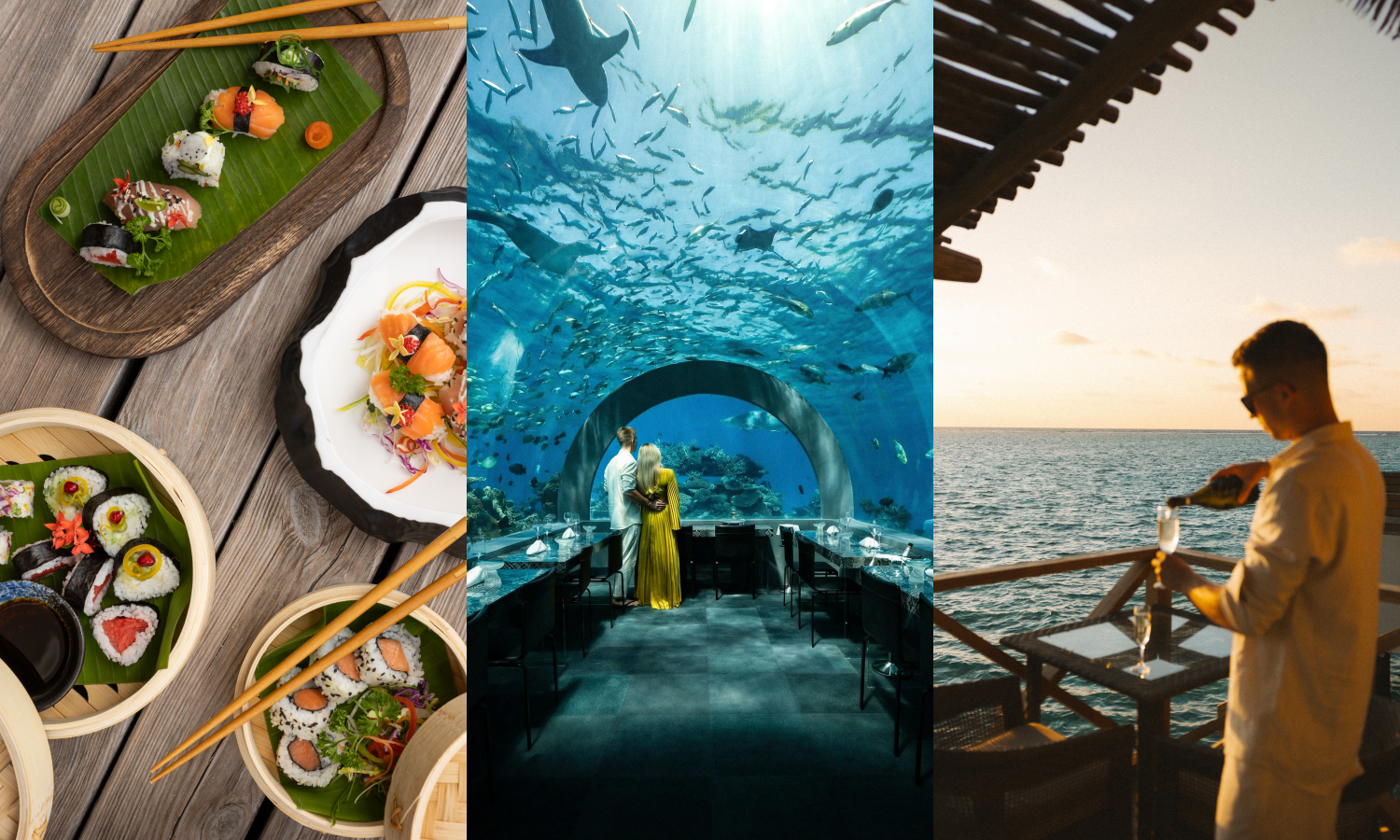
You & Me Maldives, the adults-only luxury retreat under The Cocoon Collection, has announced the launch of its new Premium All Inclusive experience, aimed at enhancing island stays through a more seamless and comprehensive offering in the Indian Ocean.
The Premium All Inclusive experience is designed to begin from the point of arrival. Guests receive complimentary access to The Cocoon Collection Lounge at the seaplane terminal at Velana International Airport, where services are provided to ensure a smooth transition before the journey to the resort.
On arrival at the island, guests are welcomed in their villas with a chilled bottle of sparkling wine and a selection of canapés. The Premium All Inclusive plan includes unlimited premium beverages by the glass, featuring a curated range of wines, signature cocktails, top-shelf spirits, international beers and non-alcoholic options. The in-villa minibar is replenished daily with soft drinks, international beers, red and white wines, as well as assorted snacks. For stays of five nights or more, guests also receive two bottles of premium liquor from a selected list, provided once during the stay.
The experience further includes a range of activities. Guests staying a minimum of three nights are offered one sunset cruise and one snorkelling excursion per stay, while those staying seven nights or more are entitled to a catamaran cruise. Unlimited use of snorkelling equipment and non-motorised water sports, including canoeing, kayaking and paddle boarding, is also included, subject to weather conditions.
Dining forms a central part of the Premium All Inclusive concept. Guests can enjoy three themed dining evenings, including a seafood barbecue under the stars featuring prawns, lobster and oysters. For stays of five nights or more, guests may also take part in a complimentary group cooking class, with a choice between ethnic or Italian cuisine, led by the resort’s culinary team.
Wellness offerings are also incorporated into the programme, with guests able to participate in up to three complimentary sunrise yoga sessions per stay, subject to availability.
The introduction of the Premium All Inclusive experience reflects the resort’s focus on personalised service and carefully curated stays. The offering is positioned to appeal to couples seeking relaxation, romance or activity-led experiences within an adults-only island setting.
Featured
Eid celebrations at SO/ Maldives blend Arabic tradition and Maldivian culture

SO/ Maldives is inviting global travellers this season to reimagine Eid not merely as a holiday, but as an immersive island escape. Located just 15 minutes by speedboat from Malé, the fashion-forward private island retreat sets the stage for a celebration where cultural heritage, contemporary luxury and tropical glamour come together.
At the centre of the festivities is an authentic culinary experience at Hadaba, the resort’s award-winning Arabic restaurant. Guests are offered Levantine flavours, artisanal mezze and traditional recipes presented with a modern approach, creating a setting for shared dining and celebration. As part of the resort’s dine-around concept, Hadaba can be included in a wider culinary journey across the island, allowing guests to experience Arabic cuisine alongside the resort’s other dining venues.
As evening falls, celebrations move to Lazuli Beach Club, where shisha rituals and Arabic-inspired refreshments are served in a beachfront setting. Traditional performances are complemented by Maldivian Boduberu drumming and fire dance displays, creating a cultural programme designed to appeal to international travellers seeking meaningful experiences.
Across the island, Eid is marked through a series of curated activities aimed at encouraging connection and creativity. Cultural workshops, including palm-leaf artistry and henna sessions, offer opportunities to explore heritage, while younger guests are engaged through themed crafts, interactive games and sweet treat decorating. The overall atmosphere remains celebratory while maintaining a relaxed pace that reflects the resort’s character.
Beyond the festive programme, the resort positions the long weekend as a fully immersive island retreat. Guests stay in beach and overwater villas featuring private pools and ocean views, with interiors inspired by high fashion. Time is spent between spa treatments, lagoon activities, beach club experiences and sunset dining, balancing celebration with seclusion.
To mark the season, the resort has introduced two limited-time stay offers. The One Night on Us offer provides savings of 33 per cent on stays of three nights or more, along with daily breakfast, complimentary transfers and spa privileges. The Soo Summer package offers preferential rates combined with spa experiences, curated dining inclusions and additional benefits for water villa stays.
Welcoming travellers from Europe, Asia, the Middle East and beyond, the resort presents Eid as a global celebration where Arabic traditions, Maldivian culture and contemporary design are brought together. This season, guests are invited to exchange routine for island surroundings and experience Eid through a redefined island perspective.
-
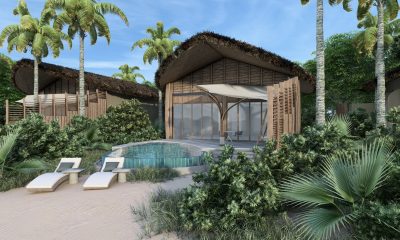
 News1 week ago
News1 week agoPulse Hotels & Resorts unveils Aura Maldives, a mindful luxury sanctuary
-
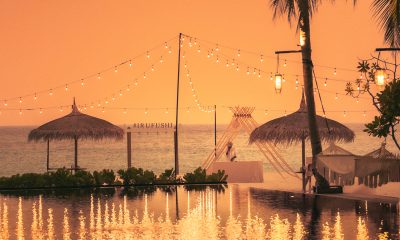
 News1 week ago
News1 week agoSun Siyam Iru Fushi sets new nenchmark with 24 Hour Premium All Inclusive Dine Around
-
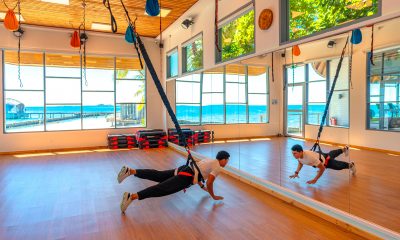
 Fitness1 week ago
Fitness1 week agoOUTRIGGER Maldives Maafushivaru launches expanded wellness programming for 2026
-
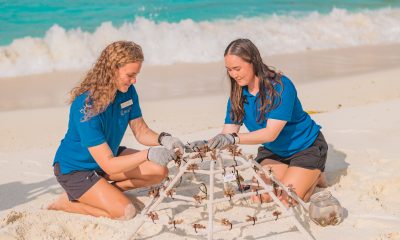
 Action1 week ago
Action1 week agoSheraton Maldives Full Moon celebrates sixth anniversary of Reefscapers collaboration
-
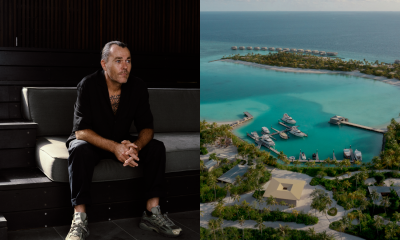
 Cooking1 week ago
Cooking1 week agoPatina Maldives hosts Chef Shannon Bennett for exclusive April residency
-
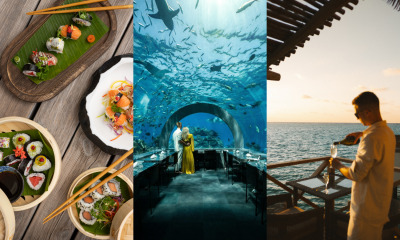
 Featured1 week ago
Featured1 week agoYou & Me Maldives unveils curated Premium All Inclusive programme
-
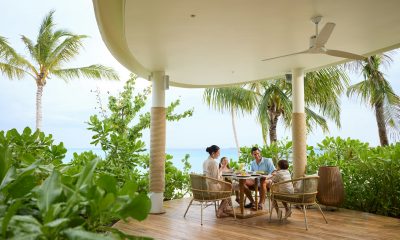
 Awards1 week ago
Awards1 week agoCentara Mirage Lagoon Maldives named Luxury Family Friendly Resort of the Year
-
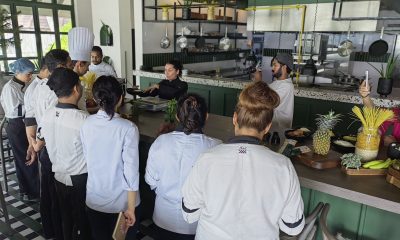
 Cooking1 week ago
Cooking1 week agoSun Siyam Olhuveli hosts Italian Chef Francesca Gambacorta at Milano restaurant



